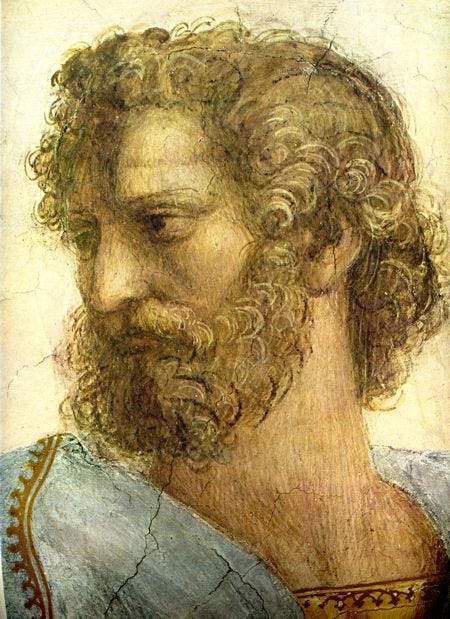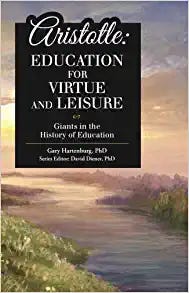Aristotle on Three Kinds of Friends
Why "Level Three" Friendship Is Needed in Classical Schools
Aristotle says there are three kinds of friends: friends that benefit you, friends that please you, and friends that make you better.
In my last article, I tried to make the case that friendship is integral education in the classical tradition, and I used Augustine’s words about sympathy, fellowship, and love as a starting off point. For Augustine, as the teacher instructs the student, the student in turn re-teaches the teacher and the common truth between them dwells within them creating a bond of friendship. This is a remarkable truth itself and one that educators should understand well and embrace.
Aristotle, writing almost a millennium before Augustine, also extols friendship as one of the great human ends, and necessary for happiness. In fact, in his Nicomachean Ethics, Aristotle writes that “without a friend no one would want to live, even if possessing all goods.”
Would you want to live without a friend? Many are lonely today, many depressed, and no doubt those who are friendless are among the most vulnerable among us, and I suspect there is a correlation between loneliness and suicide.
Aristotle notes that we all appreciate the friend who benefits us, that is who brings to us useful goods, access, or skills. Note how helpful it is to have a friend who has a pick-up truck or a great collection of power tools. Students, too, enjoy friends with goods, skills, and access. One attraction to getting into an ivy league college like Harvard is not the quality of education you will receive but the network of connections that will follow you all your professional life. Getting into Harvard will provide a student with friends who have access to power and wealth. It is this kind of access that informs the proverb It’s not what you know but who you know (or whom you know).
Level One
This first level of friendship sounds quite utilitarian doesn’t it? We want these kinds of friends because they are useful to us, because we can use them to get what we want. I want a good prospect for working at a prestigious fortune 500 corporation. Well, go to Harvard or Princeton where the children of so many fortune 500 companies go to school. Make friends with these well connected children; it will go well with you.
But let’s consider this again. I have a good friend who has a pick-up truck. I call on him about twice a year to borrow it. He always says yes. I love that he has a pick-up truck so that I don’t have to. He also seems to enjoy sharing it with me. I think he likes exercising his generosity–I certainly enjoy receiving it. He is a Christian (Greg is his name) and I suspect he is informed by such words as freely you have received, freely give and it is only in giving that we receive.
Think of the math-challenged student in math class placed next to a student gifted in math and good at explaining it. Would such a friend be welcome and useful? Would receiving math help from such a friend corrupt the friendship? No, it would rather strengthen it, or perhaps start a friendship. Classical students with gifts, like my friend Greg, should freely give, for they have been given unto. Even access to power and wealth can be given freely to bless rather than to manipulate or boast. Many times I have been introduced to new friends by my old friends only to find the new friend becoming dear and deep. Do you know something valuable? Give it away. Do you know someone remarkable and virtuous? Give him away too.
Level Two
Aristotle’s second level of friendship is also familiar to us. This level consists of those friends who please us (whether they are useful or not). This kind of friend might be the witty friend full of clever asides and humorous observations. This kind of friend might be a great storyteller and raconteur. Such a friend might be entertaining in other ways–a great musician, orator, singer, gymnast (Do a back flip for me will ya?), martial artist, juggler, or a purveyor of magic tricks. Thank God for these kinds of friends–they brighten our days, bring relief, laughter and relaxation. Students want these kinds of friends, even need them. Yes, the pleasing friend can be the class clown or buffoon (a corruption of the pleasing friend) but can also be a poet, pianist, or painter that can bring edifying and even inspiring pleasures. Surely you have friends who please you, and hopefully you bring pleasure to many of your own friends.
It is worth pausing for a moment to point out that a friend can be made useful and pleasant to us by means of his own study of the liberal arts, fine arts and the great books. Someone with great mathematical or grammatical skill and knowledge can be a very useful friend not only in a math or Latin class but in many other human endeavors. The accomplished musician and pianist is likely someone with the virtue of attention, temperance, and diligence that can inspire us as much as the music she plays.
Level Three
This brings us to Aristotle’s third level of friendship–the friend who can make us better. The math whiz and the accomplished pianist can potentially be both useful and pleasing to us. But they also have the potential to lead us to virtue, to inspire us to seek and find the good. Even our friend who entertains us with magic tricks, might also trick us into a virtue if he in fact is virtuous. This, by the way, is true of my friend Greg. He is much more to me than a pick-up truck owner. I am a better person because of him.
We might start by enjoying the music of our friend the pianist but end by admiring something we see in her character that draws us closer. Perhaps it is her dedication, constancy, and diligence. You see the way she practices, works, and studies the piano–out of love for the beauty of the music. You’re drawn in. For you, however, it might be poetry that you love (or soccer, or gardening, or Spanish) but you begin to believe that you should (and can) become more constant, more diligent. Simply the example of this friend before you begins to work on you, and you start seeking what she seeks, albeit in another art.
And we’re just getting started, because friends engage in conversation (that is they turn and dance) and way leads to way. What starts as inspiration, admiration, and imitation leads to other human experiences and vistas. The friendship of the pianist and the poet can become this third and highest form of friendship, what Aristotle calls a perfect friendship:
“Perfect friendship is the friendship of men who are good, and alike in virtue; for these wish well alike to each other qua good, and they are good in themselves. Now those who wish well to their friends for their sake are most truly friends; for they do this by reason of their own nature and not incidentally; therefore their friendship lasts as long as they are good–and goodness is an enduring thing.” (V.iii)
Do you have some “perfect friends?” Does your family, school, or homeschool intentionally promote and model such friendship? What would your life be like without virtuous friends who benefit you, please you, and make you better? What could classical schools and homeschools do that would make the importance of academic friendship more central to our entire enterprise? There ought to be no such things as a lonely, friendless student in any classical school or homeschool.
What if, as part of our assessment of students, we asked if a student had meaningful, virtuous friendships, and whether they were offering and extending friendship to others–especially older students to younger students? What if the nobility of friendship was woven through the curriculum of our schools and highlighted at opportune points–like David’s friendship with Jonathan (1 Sam. 20), Jesus and his closest three disciples, Frodo’s friendship with Sam? What if we read Aristotle on friendship (book 8 of the Ethics), Cicero’s essay (On Friendship), and Jesus in John 15 (I no longer call you servants but friends…)?
I can imagine some new school mottos, part of a school crest:
Sine amicis non virtus (without friends there is no virtue)
Sine amacitia vita vacua (without friendship life is empty)
Scientia, Virtus, Amacitia (Knowledge, Virtue, Friendship)
Friendship is central to a meaningful, blessed life, and so is central to a rich education. May it be no mere motto but a lived reality in our schools.
PS: If you have not seen my previous article on friendship, you can find it here. If you have heard my podcast on friendship you listen to it here. For a great introduction to Aristotle and his relevance to classical education, see Gary Hartenburg’s short book Aristotle: Education for Virtue and Leisure.




I read this the Friendship chapters of Aristotle in my twenties—when you has more friends than you know what to do with—and I remember thinking, we can be useful, pleasant, or good for each other. If we’re not one of those three, we’re not really friends—we’re just people who waste time together. It clarified a lot of relationships for me.
its intresting to see the ways relations are named in labled diffrently across culture, space and time